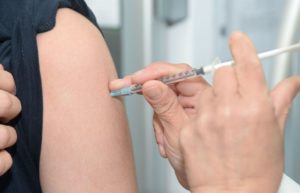 With expected holiday travel this weekend for Passover and Easter, New Jersey Health Commissioner Dr. Shereef Elnahal today urged everyone to make sure they and their family members are up to date on their measles/mumps/rubella (MMR) vaccine and all other age-appropriate immunizations.
With expected holiday travel this weekend for Passover and Easter, New Jersey Health Commissioner Dr. Shereef Elnahal today urged everyone to make sure they and their family members are up to date on their measles/mumps/rubella (MMR) vaccine and all other age-appropriate immunizations.
“The measles vaccine is safe and effective, and it is the best way to prevent the spread of this highly contagious virus,” Dr. Elnahal said. “If you’re planning an international trip, the World Health Organization recommends that adults or adolescents unsure of their immune status get a dose of the measles vaccine before traveling.”
Measles spreads rapidly through the air when an infected individual coughs or sneezes. It is so contagious that if one person has it, up to nine of 10 people around them will also become infected if they are not protected. The virus can cause serious health complications, such as pneumonia or encephalitis, and even death.
The initial symptom of the measles is a fever; infected individuals will then experience a cough, runny nose and red eyes. A tiny rash of red bumps will appear on the skin, first appearing on the head and working its way down the rest of the body.
Travelers with a fever and other symptoms of measles should limit their contact with others as much as possible to prevent the potential spread.
More than 555 cases of measles have been confirmed in 20 states this year, the second largest number of cases reported in the U.S. since measles was eliminated in 2000. As of April 8, there were 285 confirmed cases of measles in Brooklyn and Queens since October. There were 184 confirmed reported cases of measles in Rockland County, New York as of April 12. There are currently 11 cases in New Jersey associated with a second outbreak in Ocean County.
The outbreak in Israel has raised concern that Americans traveling to Israel for Passover, which is celebrated April 19-27, may be exposed to measles and could become ill if they have never had measles or have not been properly vaccinated.
“Anyone who has not been vaccinated or has not had measles is at risk if they are exposed. Two doses of measles vaccine are about 97 percent effective in preventing measles,” said Dr. Christina Tan, state epidemiologist.
Anyone who suspects they have been exposed to measles is urged to call a health care provider before going to a medical office or emergency department. Special arrangements can be made for evaluation while also protecting other patients and medical staff from possible infection.
Before international travel:
- Infants 6 through 11 months of age should receive one dose of MMR vaccine. Infants who get one dose of MMR vaccine before their first birthday should get two more doses (one dose at 12 through 15 months of age and another dose separated by at least 28 days).
- Children 1 year and older should receive two doses of MMR vaccine, separated by at least 28 days.
- Teenagers and adults who do not have evidence of immunity against measles should get two doses of MMR vaccine separated by at least 28 days.

Please be aware that Merck, manufacturer of MMR vaccine, writes in their product insert that the mumps and rubella parts of this vaccine have not been tested for safety in babies under 12 months of age.
I just found out that the MMR prescribing info sheet also says that women should not become pregnant for three months after taking this vaccine. Obviously, women who are pregnant now, or may be pregnant, should not take this vaccine.
I wonder why this crucial information is not made public. Please share this information to others who may not be reading this post. Thank you.
Only Hashem knows how much damage may be caused to babies under 12 months getting the vaccine despite the fact that it has not been tested for safety at that age, and how much damage may be caused to fetuses of women who may be pregnant and not know it when they get the vaccine, or are not told that they should not become pregnant for three months after getting the vaccine!
is it true that CDC 108 people have died from the measles vaccine? and zero from measles?
Please note that although the MMR shot is safe and effective for most healthy people, those who have a compromised immune system due to an existing serious illness should discuss the vaccine and the outbreak with their doctors before getting the vaccine.